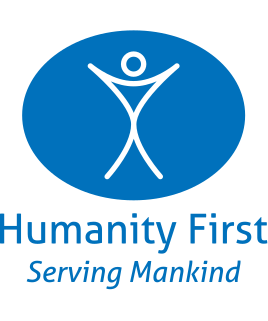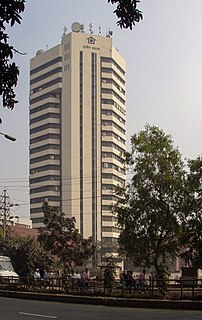
A non-governmental organization (NGO) or non-governmental organisation is an organization that generally is formed independent from government. They are typically nonprofit entities, and many of them are active in humanitarianism or the social sciences; they can also include clubs and associations that provide services to their members and others. Surveys indicate that NGOs have a high degree of public trust, which can make them a useful proxy for the concerns of society and stakeholders. However, NGOs can also be lobby groups for corporations, such as the World Economic Forum.
A Master of Business Administration is a postgraduate degree focused on business administration. The core courses in an MBA program cover various areas of business administration such as accounting, applied statistics, human resources, business communication, business ethics, business law, strategic management, business strategy, finance, managerial economics, management, entrepreneurship, marketing, supply-chain management, and operations management in a manner most relevant to management analysis and strategy. It originated in the United States in the early 20th century when the country industrialized and companies sought scientific management.

Educational Testing Service (ETS), founded in 1947, is the world's largest private nonprofit educational testing and assessment organization. It is headquartered in Lawrence Township, New Jersey, but has a Princeton address.

Corporate social responsibility (CSR) is a form of international private business self-regulation which aims to contribute to societal goals of a philanthropic, activist, or charitable nature by engaging in or supporting volunteering or ethically oriented practices. While once it was possible to describe CSR as an internal organizational policy or a corporate ethic strategy, that time has passed as various national and international laws have been developed. Various organizations have used their authority to push it beyond individual or even industry-wide initiatives. In contrast, it has been considered a form of corporate self-regulation for some time, over the last decade or so it has moved considerably from voluntary decisions at the level of individual organizations to mandatory schemes at regional, national, and international levels. Moreover, scholars and firms are using the term creating shared value- an extension of corporate social responsibility to explain ways of doing business in a socially responsible way while making profits.
The global digital divide describes global disparities, primarily between developed and developing countries, in regards to access to computing and information resources such as the Internet and the opportunities derived from such access. As with a smaller unit of analysis, this gap describes an inequality that exists, referencing a global scale.

Kaplan, Inc. is an American for-profit corporation that provides educational and training services to colleges, universities, businesses and individuals around the world. Founded in 1938 by Stanley Kaplan, the company offers a variety of test preparation, certifications and student support services. The company is headquartered in Fort Lauderdale, Florida, and is a wholly owned subsidiary of Graham Holdings Company.

IESE Business School is the graduate business school of the University of Navarra. Founded in 1958 in Barcelona where its main campus is located, IESE in 1963 formed an alliance with Harvard Business School (HBS) and launched the first two-year MBA program in Europe. IESE has campuses in Barcelona, Madrid, Munich, New York and São Paulo.

A telecentre is a public place where people can access computers, the Internet, and other digital technologies that enable them to gather information, create, learn, and communicate with others while they develop essential digital skills. Telecentres exist in almost every country, although they sometimes go by a different names including public internet access center (PIAP), village knowledge center, infocenter, Telecottage, Electronic Village Hall, community technology center (CTC), community multimedia center (CMC), multipurpose community telecentre (MCT), Common/Citizen Service Centre (CSC) and school-based telecentre. While each telecentre is different, their common focus is on the use of digital technologies to support community, economic, educational, and social development—reducing isolation, bridging the digital divide, promoting health issues, creating economic opportunities, and reaching out to youth for example.

SDA Bocconi School of Management is the graduate business school of Bocconi University. It is the leading School of Management in Italy and also stands among the top-ranked European institutions. SDA Bocconi offers executive, custom and MBA programs, as well as specialized masters, and regularly takes on research projects on commission. SDA Bocconi School of Management also has an offshore presence in Mumbai, India called the SDA Bocconi Asia Center.
Community organization or Community Based Organization refers to organization aimed at making desired improvements to a community's social health, well-being, and overall functioning. Community organization occurs in geographically, psychosocially, culturally, spiritually, and digitally bounded communities.

Universitas Terbuka is Indonesia's state university and employs open and distance learning (ODL) system to widen access to higher education to all Indonesian citizens, including those who live in remote islands throughout the country, as well as in various parts of the world. It has a total student body of 1,045,665 as of 2019/2020 according to Indonesia's Ministry of Education Higher Education database. According to a distance education institution in the UK, which published "The Top Ten Mega Universities", UT-3 ranks closely with universities from China and Turkey.

Energy poverty is lack of access to modern energy services. It refers to the situation of large numbers of people in developing countries and some people in developed countries whose well-being is negatively affected by very low consumption of energy, use of dirty or polluting fuels, and excessive time spent collecting fuel to meet basic needs. Today, 759 million people lack access to consistent electricity and 2.6 billion people use dangerous and inefficient cooking systems. It is inversely related to access to modern energy services, although improving access is only one factor in efforts to reduce energy poverty. Energy poverty is distinct from fuel poverty, which primarily focuses solely on the issue of affordability.

Humanity First is an international charity that provides disaster relief and long term development assistance to vulnerable communities in 52 countries across 6 continents. The organisation is run by volunteers with diverse skillsets across the world and has access to thousands of extra volunteers worldwide. Volunteer staff in all areas often pay their own expenses to support the international projects.

The Grameen family of organizations has grown beyond Grameen Bank into a multi-faceted group of profitable and non-profit ventures, established by Muhammad Yunus, the Nobel Peace Prize winning founder of Grameen Bank. Most of these organizations have central offices at the Grameen Bank Complex in Mirpur, Dhaka, Bangladesh. The Grameen Bank started to diversify in the late 1980s when it started attending to unutilized or underutilized fishing ponds, as well as irrigation pumps like deep tubewells. In 1989, these diversified interests started growing into separate organizations, as the fisheries project became Grameen Fisheries Foundation and the irrigation project became Grameen Krishi Foundation.

Arthur Sweetser (1888–1968) was an international journalist and statesman.
The UNESCO stated “education for sustainable development is a broad task that calls for the full involvement of multiple educational organizations and groups in bureaucracies and civil societies. These include Non-Governmental Organizations or NGOs.

The Partnership for Refugees is a refugee public-private partnership established in June 2016 as the Partnership for Refugees by the Obama administration to facilitate President Barack Obama's commitment to creative solutions for the refugee crisis engaging the private sector. The Partnership, an initiative established through collaboration between the State Department and USA for UNHCR with significant support from Accenture Federal Services, was established to facilitate private sector commitments in response to President Obama's June 30, 2016 Call to Action for Private Sector Engagement on the Global Refugee Crisis. On September 20, 2016, at the Leaders Summit on Refugees at the United Nations, President Obama announced that 51 companies from across the American economy have pledged to make new, measurable and significant commitments that will have a durable impact on refugees residing in countries on the frontlines of the global refugee crisis and in countries of resettlement, like the United States.
In commerce, global supply-chain management is defined as the distribution of goods and services throughout a trans-national companies' global network to maximize profit and minimize waste. Essentially, global supply chain-management is the same as supply-chain management, but it focuses on companies and organizations that are trans-national.












